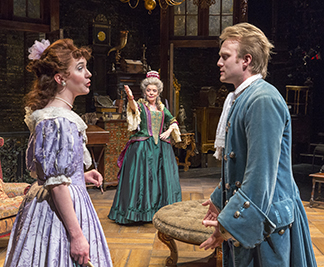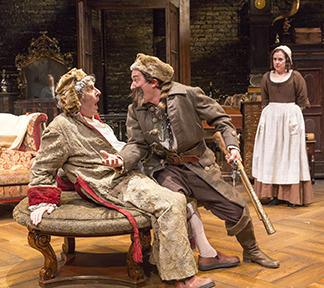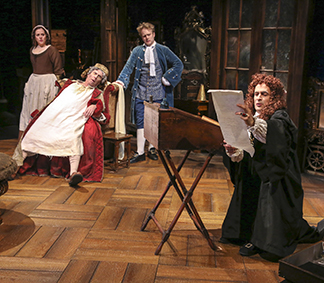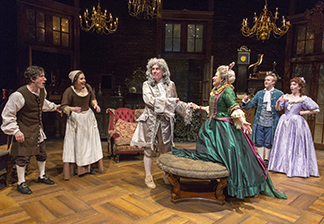By Lucy Komisar

Can an early 18th century French play be hysterically funny and up to the minute in New York? Yes, if the author is David Ives who has turned a 1708 restoration comedy by Jean-FranÒois Regnard into a very witty commentary on greed, including the ethics of cut-throat capitalism. Plus Òa change…
The masterful director is John Rando, who gave us the political satires “Urinetown,” “The Toxic Avenger” and Ives‘ “All in the Timing.” This is one of the best plays of the season.
Ives has crafted a broad modern on a tale about greed written in rhyming couplets at the turn of the century – that is the 17th-to-18th century. It‘s aristocratic (1%) France. Gilt chandeliers adorn a rich man‘s sitting room. His nephew, Eraste (an appealing Dave Quay) in an aquamarine velvet coat, has been waiting around for years to collect a lucrative inheritance. He wants to marry the fetching Isabelle (charming Amelia Pedlow in violet gown), but her mother Madame Argante (a tough, take-no-prisoners Suzanne Bertish) won‘t consent unless he has ready cash.
But though the rich uncle, Geronte (a wonderful Paxton Whitehead), seems always at death‘s door, he never seems to wheeze his last. And worse, the old guy wants to marry Isabelle, though he calls her Georgina (a former love?)
Things come to a head when he calls a lawyer to write his will. He tells Eraste that he plans to leave some money to relatives he‘s just heard from, an American nephew and a niece who‘s a pig farmer‘s wife.

Eraste is frantic. But his clever valet Crispin (Carson Elrod), disguises himself as the obnoxious loud mouthed American, with a coonskin cap, woodsman‘s garb and Texas accent, to destroy this fellow‘s chances. Elrod is wonderfully physical, jittery, jumpy, limbs akimbo, almost acrobatic.
Then Crispin, his lover Lisette (Claire Karpen), who is Geronte‘s maid, and Isabelle, arrive one after the other, each dressed as the feckless pig farmer‘s wife.
When they have persuaded Geronte to disinherit these fraudsters, they cry, “A million! A million! A million!” And Lisette declaims to Eraste, “Congratulations, sir, from social scum!” The four join hands and Crispin declares, “Now all for one, and one… The rest you know. And here‘s to holy matri-money! “
Meanwhile, Ives livens up the script with current politics. Geronte complains about the prices charged by doctors and declares, “Of course if we had national health insurance…But this is seventeen-oh-what?” (oh-eight)
When Madame Argante appears to have solved the cash flow problem with a box of Geronte’s francs she has acquired, she declares to the impecunious suitor Eraste, “Is it my fault your spending powers are spent? That you‘re one of the Ninety-Nine Percent?” Estate punches the air.

Ives inserts a couple of comic faux film moments where the lovers, Eraste and Isabelle, in spotlight, declaim:
Eraste: “Ah, mon amour!
Isabelle: Je t‘aime!
Eraste: Je t‘aime!
Isabelle: La lune!
Eraste: Le soir!
(Et plus.)
The lawyer, smartly named Scruple (a funny, sharp David Pittu), is described as no bigger than a loophole. Pittu plays him on his knees.
These plays always had a moral, and Crispin establishes one here: “… capitalism, cut throat, self-promotion/ In case you didn‘t know the ethic this is about.”
And he inquires if it isn‘t also “the rise of the bourgeoisie and a proto-capitalist society / devoted to competition, consumerism, and cut-throat self-promotion?” (One assumes Ives updated Regnard’s text of 1708.)
Geronte, who suddenly regains his health, finally understands what is going on and gets philosophical, “And let me toss this thought into the cup:/If people hope you dead, you have Fucked Up.”

Madame Argante also gets the moral, declaiming:
How gold has “clogged history‘s onward march with wars of greed/,
Usurped the common good for private need,/
Transforming me into a heartless vulture/
Who as a blushing maid craved art, and culture!/
Who played bad folk songs wearing purple tights, /
Smoked weed, and argued for the people‘s rights!/
Well, I‘ll no more be slave to money‘s chains,/
But do what mere humanity ordains!/
SOCIALISM!
The others hold up fists. Geronte says: “This is America! “ They sigh, and take down their fists. He corrects himself. “France!” They hold up their fists and twist-dance off stage.
Lucky America that, in spite of the money-buys-all political and economic system that the text suggests, it has Ives‘s terrific play.
“The Heir Apparent.” By David Ives, adapted from play by Jean-FranÒois Regnard; directed by John Rando. Classic Stage Company, 136 East 13th Street, New York City. 212-352-3101. Opened April 9, 2014; closes May 4, 2014. 4/21/14. Review on New York Theatre Wire.

